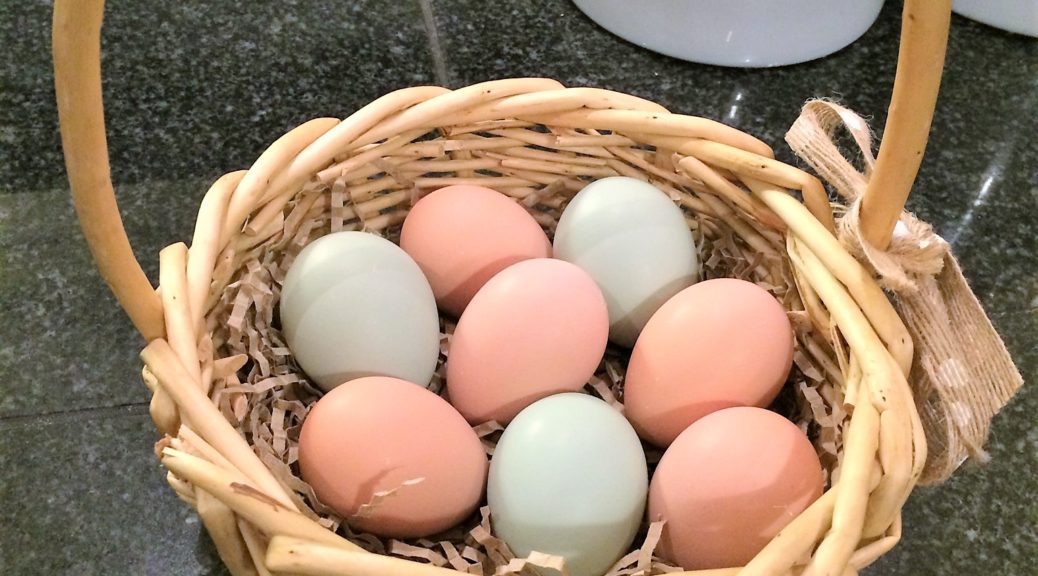
Egg Storage: Your Questions Answered!
We have reached an exciting (I didn’t put egg-citing, you’re welcome) point in our little urban homestead. We actually have enough fresh eggs around here to stop buying them from the store!! You may have noticed in some of my egg posts (When Will My Chickens Lay Their First Eggs, Easter Eggs in August) that I keep my eggs in a cute little basket on the counter. I’ve gotten a ton of questions about this lately – why aren’t they in the fridge? Is that safe? How long can they sit out? Do you wash them? Are you crazy? (Okay, I may have inferred that last one.) So I decided it was time to answer all your burning questions about egg storage!
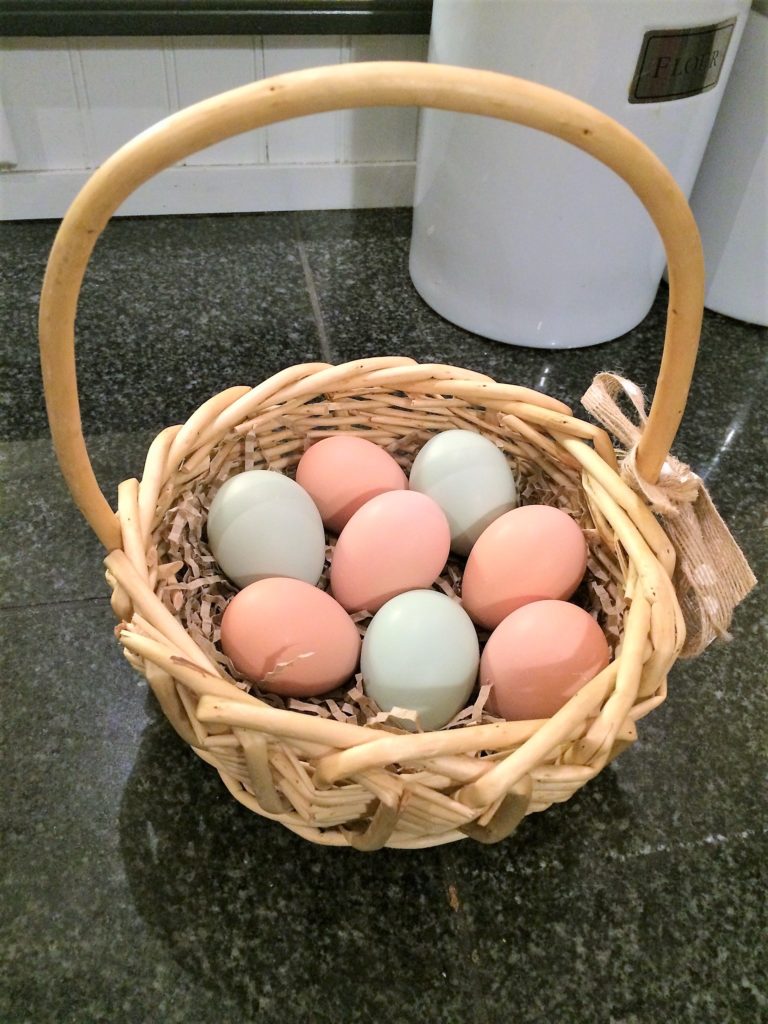
Q: How should I store my eggs?
A: The very best way to store fresh eggs from your own chickens is at room temperature. Really! When eggs are laid they’re covered in a protective coating called a bloom. Egg shells are naturally porous; air, water, germs, and smells can enter the shell. But the bloom seals the egg and blocks bacteria from entering, keeping the egg fresh and safe. However, when you chill an egg, the yolk and white inside do what all chilled liquids do: they expand. This essentially “breaks” the bloom, allowing bacteria to get in. So your eggs are better off on the counter than in the fridge. This is normal in Europe and most other countries, where they don’t even refrigerate eggs at the store.
You should also store eggs with their pointed end facing down. The blunt end of the egg contains an air sac, and storing with the blunt end down will cause the air sac to move. Keeping the air sac at the top prevents it from rupturing and introducing bacteria. It also keeps your yolk centered – which is only important if you’re making deviled eggs and want them to look just right!
Q: How long will my eggs stay fresh?
A: Kept at room temperature, eggs are safe and good to eat for at least 4-6 weeks. Many people and experiments have shown that this time could be extended considerably. Personally I prefer to eat mine within two weeks, or refrigerate them. If you’re not planning to eat your eggs within a month, go ahead and stick them in the fridge. Eggs can stay fresh about 7 times longer when chilled. Refrigerated eggs are good for 4-6 months.
Does that sound sketchy to you? Consider this. When you buy eggs at the store, they are often 1-2 months old already. You can find out when your eggs were packaged by checking the 3-digit number next to the “Sell By” date on your carton. For my carton here, that would be day 173 – June 22nd. The “sell by” date is a month later, July 21st. Note that this is not an expiration or even “best by” date. Eggs are considered fresh for 4-5 weeks past the sell by date… which is 2 months past the date they were packaged. They also had to go through a washing process first, adding to their age. And those are eggs without their protective bloom!
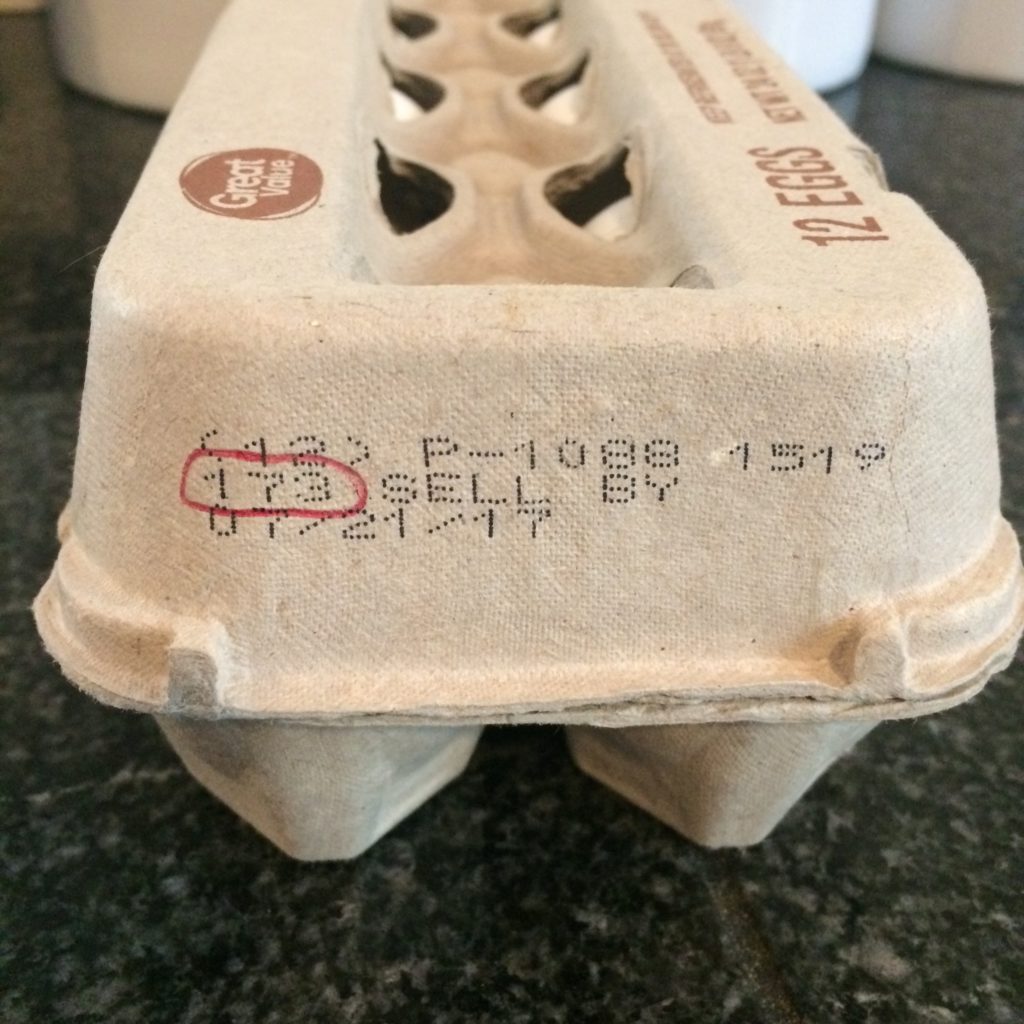
Q: Should I wash my eggs?
A: This is one of the most common questions asked by new chicken owners. The answer is no, you should not wash your eggs. Remember the bloom we talked about? Washing removes this protective bloom, putting your eggs at risk for bacteria entering. In fact, washing eggs before selling is actually illegal in parts of Europe! If it really bothers you to eat unwashed eggs, you can always wash them right before using.
Your eggs should come out of the nest looking clean and spiffy. If done properly, nest boxes are very clean places. If they’re low enough that your chickens can’t stand up, they likely won’t poop inside the nests. Also make sure they’re not able to roost directly on or above the nest box at night. Put up some next box curtains to keep out nosy non-layers who might make a mess.
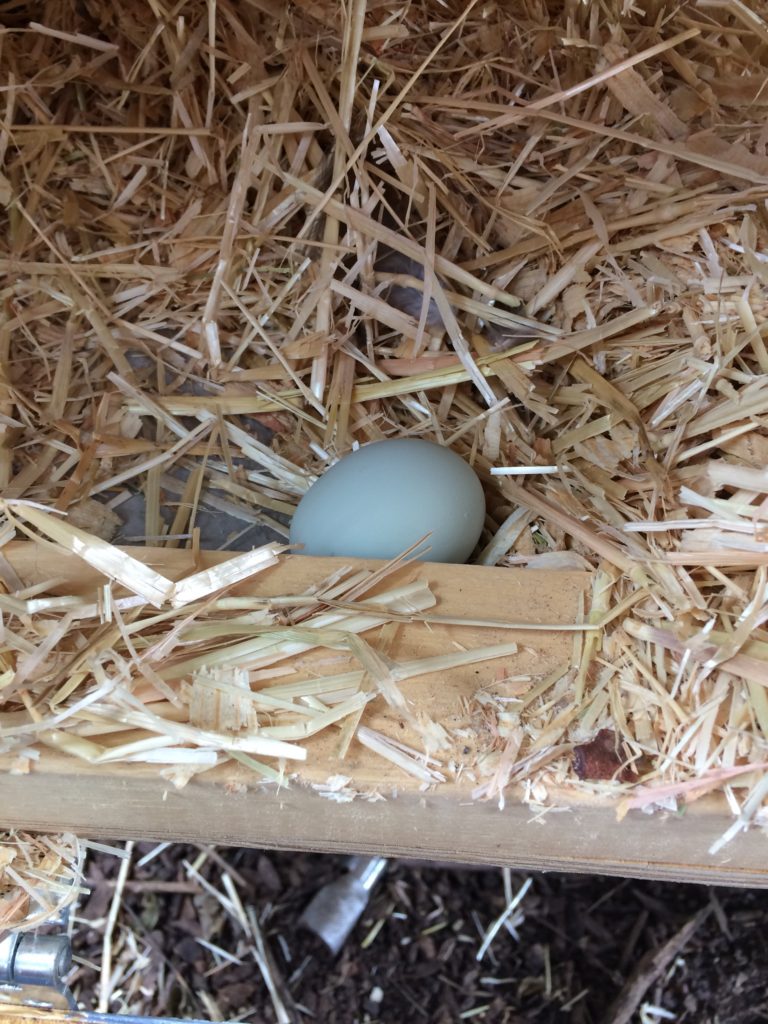
If you do get an occasional dirty egg, you can buff it clean with sandpaper or wash it with water only. Be sure to use warm water. Cold water will create a vacuum that sucks the dirt and bacteria right inside the egg. Washed eggs must be refrigerated due to loss of the protective bloom. Use these eggs first to reduce risk of contamination. Alternatively, you can scramble the washed egg (shell included!) and feed it back to your chickens or dogs.
Q: What if I don’t get to my eggs right away? Can they be left in the nest box?
A: An extra day or two in the nest box certainly won’t hurt anything. Eggs can technically be left in the nest box for a couple weeks after being laid, and still be fine to eat. Of course this depends on the weather, too. If it’s hot out, bring them to a controlled environment sooner rather than later. If it’s very cold out, eggs run the risk of freezing and cracking. So while eggs are fine outside for a while, I wouldn’t make a habit of it.
Q: How can I tell if my eggs are fresh?
A: You can quickly and easily perform the Egg Float Test. Simply place an egg in a glass of water. If the egg stays on the bottom of the glass, it’s nice and fresh. If it starts to float but still touches the bottom, it’s 1-3 weeks old and should be used soon. An egg that floats completely is an older egg, and should either be used immediately or thrown out. Always crack an egg into a separate container, rather than directly into whatever dish you’re making. If the egg looks and smells fine, it’s okay to eat! If not, you’ll be glad you didn’t ruin your whole meal.
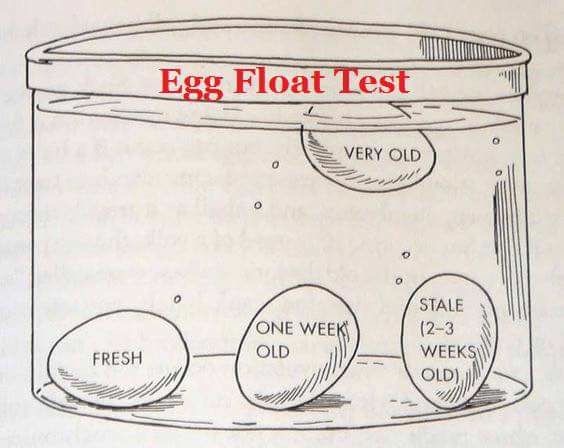
Q: Can I eat fertilized eggs?
A: Yes! If you have a rooster, odds are many of your eggs will end up fertilized. They are perfectly safe to eat! You can tell if an egg is fertilized by looking for a white “bullseye” in the yolk. It makes no difference to the flavor, and actually a fertilized egg will stay fresh longer. Of course, if you leave a fertilized egg in the nest too long with a broody hen, it will start to develop. While this is considered a delicacy in some cultures, I would personally steer clear! If you aren’t sure, you can “candle” an egg. Hold a penlight up to the egg and check for dark spots or veins inside. This is a sure sign you have a chick on the way!
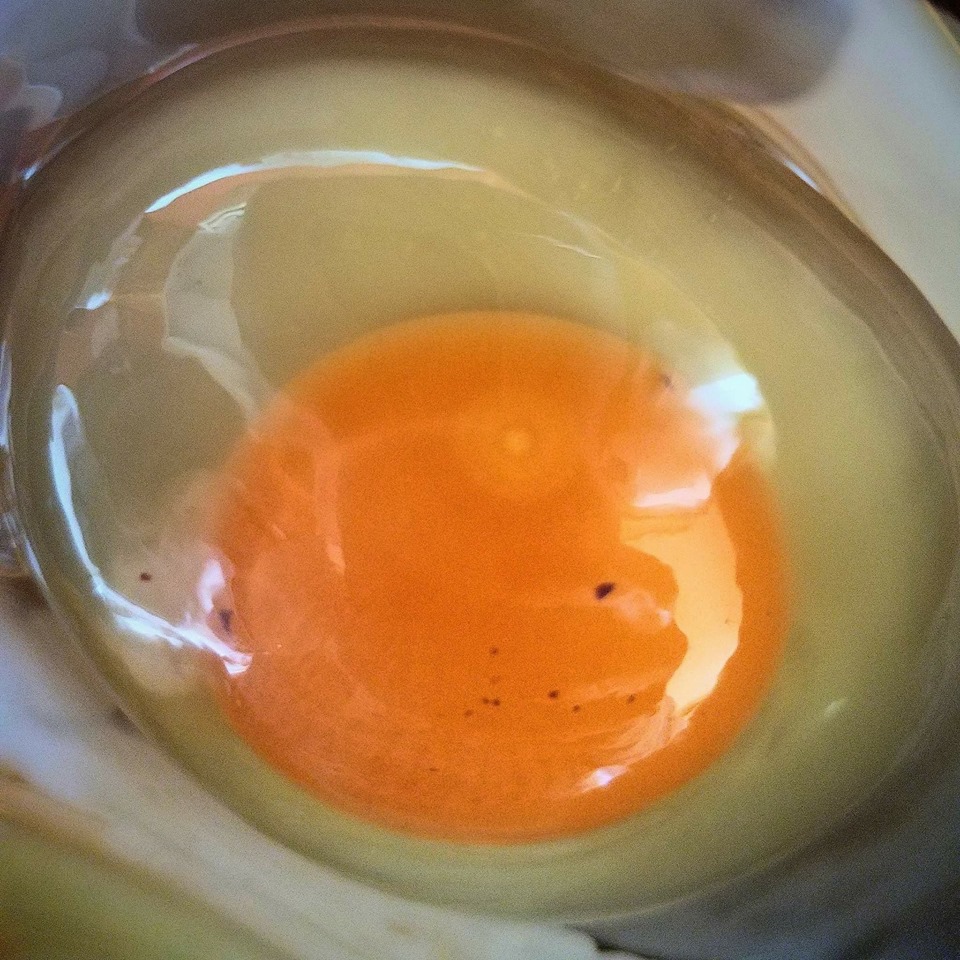
Q: Is there a way to store eggs long-term?
A: Some people have touted the benefits of storing eggs in sawdust, water baths, lard, or covered in Vaseline. While it would be a neat trick, research has shown it doesn’t make a significant difference in how long eggs last. Plus it’s kind of gross, don’t you think? The best way to store fresh eggs for months at a time is to put unwashed eggs in the refrigerator.
To store eggs even longer, you can crack them into a bowl and freeze them. The yolks do tend to gel when frozen. To help prevent this, you can add salt or sugar and lightly beat the eggs. If you want to store them for savory dishes, add 1/8 tsp salt for every 4 large eggs. To use them in sweet recipes, add 1 1/2 tsp sugar per every 4 large eggs. Use a lidded bowl and seal it tightly. Be sure to mark the container with the number of eggs and what kind of dish they’re for. Frozen eggs will stay fresh up to a year! Just place the bowl in the fridge overnight to defrost.
Q: Any other egg safety tips for me?
A: Don’t eat a cracked egg. If the shell is cracked but the internal membrane is intact, you may cook the egg and feed it to your chickens or dogs. Wash your hands after handling your chickens. You probably shouldn’t lick them. (You’re not supposed to kiss them either, just like you’re not supposed to let your dog lick your face, but sometimes they are irresistible. Here are some great common sense tips regarding germs and salmonella.)
Try to eat your oldest eggs first. You can write the date on the shell with a pencil or crayon. Or buy one of these super cute egg skelters that will keep them in order! (Click the image for the link.) I’m just dying to have one. Luckily my birthday is coming up in a few days… hint, hint. 😉
That’s all my advice for now! If you have any other questions about eggs or egg storage, leave me a comment or shoot me an email. If I don’t know the answer, I’ll find one! May your eggs be fresh, and your chickens be happy!
~~~

3 thoughts on “Egg Storage: Your Questions Answered!”
Walmart.com $14.99. Amazon, 17.99.
my husband put the carton of fresh UNWASHED eggs i got into the refrigerator. are they still safe to consume now?
Yes I wouldn’t worry about it at all! The temperatures outside fluctuate like crazy and we don’t worry about that, so I think inside it’s safe, too. In fact I just put a carton of unwashed eggs in my fridge yesterday, they are producing like crazy this time of year and I can’t keep up sometimes!